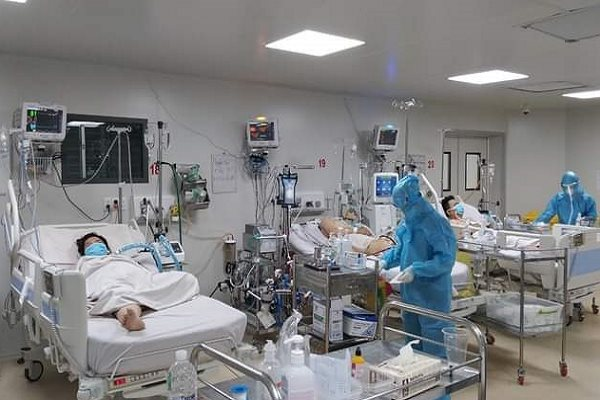
Minister of Health Nguyen Thanh Long yesterday emphasised the strategy of reducing treatment workload and minimising deaths from COVID-19 at an online training conference on management, treatment and care of COVID-19 patients and safe vaccination.
 |
| Inside a COVID-19 intensive care unit in HCM City. |
Minister of Health Nguyen Thanh Long yesterday emphasised the strategy of reducing treatment workload and minimising deaths from COVID-19 at an online training conference on management, treatment and care of COVID-19 patients and safe vaccination.
Long said that besides prevention, treatment is a key priority for localities in the current period to minimise deaths. From anti-pandemic experience, he pointed out the need to draw some lessons.
Firstly, the organisation of medical examination and treatment, and especially the treatment of COVID-19 patients, has changed on the principle that all people have access to health services.
At the central level, the National Assembly and the Government have agreed to allow the establishment of field hospitals and active resuscitation centres.
For localities, the Ministry of Health has instructed the division of treatment levels according to the model of a three-level treatment strategy – sorting asymptomatic cases and patients with minimal symptoms into field hospitals, mild cases into COVID-19 hospitals, and serious cases into COVID-19 intensive care centres.
"In the future, we will pilot a home treatment model in HCM City and a number of other provinces and cities when the number of infections increases rapidly, exceeding the capacity of facilities. This treatment level is very important for patients to have the fastest access to medical services," Long said.
At the second level of treatment, it’s extremely important to have enough oxygen for the patients, as well as anticoagulant and anti-inflammatory drugs.
“If we do a good job of treatment at this level, it will reduce the number of serious cases and increase the possibility of saving more lives,” Long said.
The Ministry of Health has issued documents requesting, urging and instructing localities to ensure oxygen for treatment at this level. Therefore, localities must immediately review all medical facilities to see if the amount of oxygen can meet the needs of treatment.
"This is an extremely important treatment level, so localities must pay special attention to strengthening the capacity of medical facilities to ensure that the highest techniques can be performed when needed. For the second level, we recommend using a high-flow nasal cannula (HFNC) oxygen therapy in treatment, a non-invasive ventilator, and some other equipment that can be controlled by medical staff,” Long said.
The third level is the intensive care unit. All localities must prepare both human resources and equipment for this treatment level. Health staff must be able to use invasive ventilators.
"Localities need to review the treatment level in the area, on the principle of increasing the maximum capacity of treatment in order to not be passive in any circumstances. We must prepare a scenario which is more serious than the real situation," Long said.
Human resources
The Ministry of Health has sent a document requiring that localities mobilise the private health sector to participate and coordinate closely so that everyone has access to medical services.
The minister noted that there must be regular and continuous training on the use of ventilators for medical staff and on ensuring safety when operating them.
“It’s always easier said than done, from small things like how to put on and take off protective gear to how to wear a mask."
At the conference, Minister Long said that the Ministry of Health has mobilised huge central support for the city, establishing one hospital and four Intensive Care Centres for severe and critical patients.
In addition, the Ministry of Health has established intensive care treatment centres in Binh Duong, Dong Nai, Tien Giang, Vinh Long and Can Tho provinces.
The Ministry of Health requires medical facilities nationwide to reserve at least 40 per cent of their human resources to be ready for worsening situations in other localities.
Also, the Minister of Health said the treatment protocols have been revised in a more accessible manner, ensuring wide access to all medicines. At this time, the Ministry of Health will implement a pilot home treatment programme, using the drug Molnupiravir, one of the drugs that has been evaluated to quickly reduce viral concentrations.
The councils on medical ethics and science under the health ministry and experts are working on the implementation when this drug is available. The Ministry of Health suggested that establishments import drugs and increase the production of this drug.
The Ministry of Health also suggested that businesses that can produce this drug can exchange with businesses that have the copyright to transfer technology to produce this drug. This is a very important issue in community treatment.
(Source: VNS)





